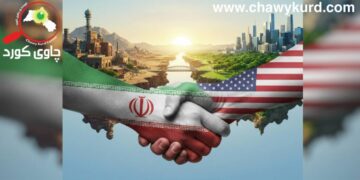The Iran–Israel rivalry is not a new phenomenon. For decades, it has shaped the strategic dynamics of the Middle East, but lately, it feels different. What was once a battle of words, covert operations, and proxy confrontations is rapidly evolving into a phase of open conflict. Missile attacks, cyberattacks, and regional mobilization indicate a dangerous transition from covert hostilities to all-out warfare. Amid this intensifying struggle, one actor remains strategically vital yet politically vulnerable: Kurdistan.
The Kurdistan Region of Iraq, situated at the crossroads of Iran, Iraq, Syria, and Turkey, is caught in an increasingly precarious position. Although not a direct player in the Iran–Israel rivalry, Kurdistan has become an unwitting pawn, entangled in the geopolitical space between these two regional giants. Its geographical location, political ambiguity, and foreign relations place it at the center of external power struggles and proxy warfare.
In March 2022 and again in early 2024, Iran launched missile strikes on Erbil, claiming to have hit Israeli intelligence facilities. Though the Kurdistan Regional Government and Israeli officials denied the accusations, the message from Tehran was unmistakable: Kurdistan could be seen as a launching pad for Israeli influence in the region. This is a troubling reality for the KRG, which finds itself balancing precariously between two competing interests.
Israel’s involvement with Kurdish movements stretches back to the 1960s, when it saw the Kurds as a counterweight to hostile Arab regimes and, more recently, to Iran. The 2017 Kurdish independence referendum, though met with hesitation from some Western allies, was endorsed publicly by Israel a move that Iran viewed as a direct challenge to its territorial integrity and regional dominance.
Iran’s fear of Kurdish autonomy is not limited to Iraq. Within its own borders, Iran’s Kurdish population is seen as a threat, particularly due to the presence of the PJAK, a Kurdish opposition group that Tehran accuses of being supported by Israel and the United States. This makes both Iraqi Kurdistan and Iran’s own Kurdish regions potential flashpoints in the larger conflict between Iran and Israel.
Caught between these competing pressures, the KRG faces a delicate balancing act. On the one hand, it must maintain important economic and security ties with Iran, which remains a key neighbor and a regional power. On the other hand, the KRG has established close cooperation with the United States, and by extension, is viewed by Tehran as potentially sympathetic to Israeli interests. This strategic dilemma makes Kurdistan both a security concern and a diplomatic opportunity for external powers.
Kurdistan: In the Line of Fire or the Eye of the Storm?
As the Iran–Israel conflict moves toward full-scale war, Kurdistan faces a stark choice. It risks becoming an involuntary battleground a region subjected to missile exchanges, intelligence warfare, and proxy retaliation. Yet, paradoxically, it could also serve as a buffer space that absorbs regional tensions without fully collapsing under pressure.
This is Kurdistan’s strategic dilemma: too central to ignore, yet too constrained to pick a side. Whether it becomes the line of fire or the eye of the storm depends largely on the restraint of regional powers and the KRG’s ability to navigate its neutrality in an increasingly polarized Middle East. The choices it makes now will resonate far beyond its borders, shaping the future of the region’s delicate balance.





























































